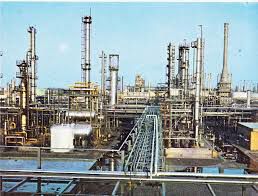1954: THE BRITISH CONSERVATIVE GOVERNMENT AND THE ENDING OF THE NATIONALISATION OF THE ANGLO-IRANIAN OIL COMPANY’S CRISIS.
On 2nd August 1951, the drafting of a joint plan of action to meet the shortage of oil as a result of shutting down of Iranian oil began, by the British and American committees. Within a few weeks, in accordance with the plan adopted by the two countries’ committees, production in Venezuela, Saudi Arabia, Kuwait and Canada was increased by a monthly total of 2,000,000 tons.
During the first half of 1952, Middle East oil production rose by 15,000,000 tons, thus exactly replacing the lost output from Iran.
Total Middle East production rose from 97,100,000 tons in 1951, to 106,100,000 in 1952, one sixth of the world’s output and second only to the 300,000,000 tons of the United States.¹
The Deputy Petroleum Administrator and President of the StandardOil Company of Indians, Bruce Brown, reported that of the daily loss of 660,000 barrels, 500,000 had already been made up from American and British sources. According to him,
200,000 barrels a day, normally shipped from the Middle East to the United States, had been diverted to Europe, and production in Texas and Louisiana stepped up accordingly.²
Though there was disruption in its trading patterns and efforts had to be made to rectify matters, the Anglo-Iranian Oil Company, for its part, was not financially hit, from the denial to it of its largest oil fields and its principal refinery, since it had plenty of other available sources of crude. ‘Kuwait production was dramatically stepped up to take its place.’³
Additional liftings were made from Iraq, and production in Qatar was stepped up rapidly; Kuwaiti oil proved to be particularly plentiful and even cheaper to produce than Iranian oil, being so located and under such natural pressure as to flow through quite short pipelines to tankers without the need for pumping.
The establishment of the two British and American committees or the Joint Plan of Action, besides what has been said, secured schemes for the purchasing, loan, sale or exchange of crude oil, petroleum products and blending agents for distribution in foreign countries, among the participating companies. It provided arrangements for the most efficient use, without regard to ownership of terminal and strong facilities, tankers, pipelines, and other transportation facilities to minimise duplications, multiple loadings, and dischargings, split cargoes, cross hauling and back hauling, and idle time in port.
As Iranian oil production was being disrupted, therefore shortage of fuel had to be made up. Also the Korean War was still going on and shortage of fuel would have important strategic implications. Additionally, Britain’s role in the defence of the West was important and alternative supplies of oil from here had to be found, even though the US disagreed with British policy in the Iranian crisis.
Iran was facing a serious foreign exchange crisis and had been losing approximately £260 million each year. By this time the Iranian Prime Minister, Dr. Musaddiq, was anxious to obtain an emphatic popular endorsement for his policy and the Majlis (the Iranian Parliament) which was as far committed as he was himself to such a policy. The new Majlis which assembled in April 1952 voted by a large majority for the reappointment of Dr. Musaddiq as Prime Minister. In accordance with the constitution, Musaddiq had resigned on the election of a new Majlis. To solve the country’s economic crisis, on 13th July 1952, Musaddiq asked the Majlis to grant him full powers for a period of six months. This request involved his taking over the Ministry of War Portfolio. The Shah refused his demand. Musaddiq promptly resigned. Therefore the Shah appointed Qavam as-Saltane, as the new Prime Minister.
- L. P. ELWELL-SUTTON, op. cit., p. 302.
- Ibid.
- S. STRANGE, Sterling and British Policy, (London: Oxford University Press, 1971)



